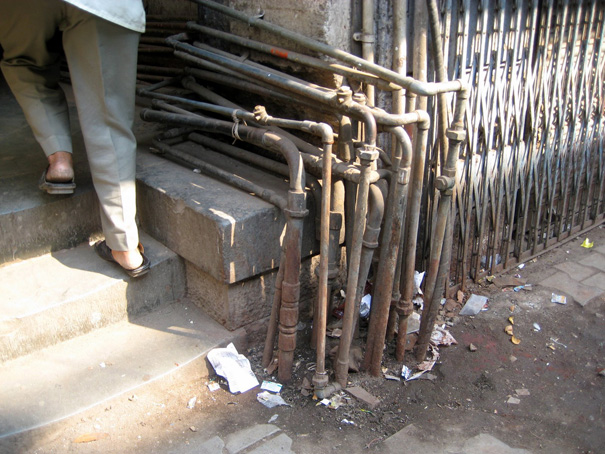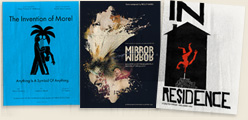World of Sound
“ingeria”
The sound of a new country, created by combining the recordings of India and Nigeria, along with other assorted sounds and music.
Listen as honks and tinkling side street sounds mingle with voices from the past.
Khorog, Tajikistan
This recording is from a group of Falaki (singers of Falak) in Khorog, the main city in Tajik Badakhshan. Khorog was created 85 years ago in the Pamir mountains, otherwise known as the “Roof of the World.”
With peaks of 7,000 meters, the Badakshan region is a labryinth of isolated rocky valleys. The winter snows prevent all transportation for six months and the spring thaw washes out the roads that balance on the cliff sides. Language has evolved in isolation to the degree that each valley has its own dialect. These singers were musicians that had moved to the main town, with markets and amenities like electricity, which is on timeshare on opposite shores of the thick grey Panj river. The Falak they sing are composed of lines from different poems, poems collected from knowledgeable men from the distant valleys and compiled in many worn handwritten daftar (notebooks). The poetry may have originated from ancient Persian compositions, or be in the local dialect. As they offered their lines to the ensemble, the ladies of the house gently twirled. We sat under the chaharpanjah, a skylight window with four frames, representing stages to the heavens, with the shadows of the dancers lit by a gas lamp.
Oshogbo, Nigeria
I went to the Yoruba heartland in Nigeria to write a travel article about Oshogbo, a sacred city where every year more than a million people arrive in August from all over the world to pay tribute to Osun, the goddess of the river by the same name.
The area is a place where traditional West African religion is alive and all around. On my first day I saw altars erected deep in a forest grove — sites of worship for each deity’s dedicated cult. Nearby, I watched petitioners file into a pink-and-black painted temple where three graying priestesses channeled the divine by reading scattered kola nuts and making animal sacrifices. On the wall was a sign with the mobile phone number of one of the women — immediate spiritual intervention brought to you by cellular technology. High tech Juju.
I was impressed by how fully modern reality is integrated with practices that, to me, seemed from a different time. In addition to witnessing for the first time traditional Yoruba religion in its original setting, I noticed also just how many churches and mosques there were in Oshogbo — sometimes several all lined in a row. Even religions that I grew up with in the US seemed new to me as practiced with a religiosity I had scarcely before seen. Something was present in these peoples’ lives that is largely absent from those of most of my American and, more so, European friends. I wondered about the consequences of this, for any of us.
That night, I booked into a guesthouse outside of town and asked a young man working there to fetch bottles of cold Star beer. I sat on a rooftop terrace with Tunde, the driver I had hired, and we let our limbs hang loose after a long day. We drank, dipped pinches of eba and hunks of goat meat into a stewy pool of oil and chilies and chatted about our lives. In the distance I heard singing. Tunde said it was from a church we had passed on our way. It's after one in the morning, I said in awe. When I retired to my room around 2am the music continued to filter through my window screen. I put on a shirt and went outside. I crossed the road and crept through moist grasses in darkness to a place where I hid myself among bushes only 40 yards from a simple one-floor concrete building. Set in the middle of a field, itself musical with the vibrations of insects, the church was erupting with singing, drumming, hand claps and praise.
Mumbai, India

Photograph by Travis Pantin
On a walk down the jostling side streets of the Chor Bazaar (Thieves Market) in downtown Mumbai, you’ll run into all manner of hawkers, chaat sellers, freelance transporters, junk purveyors, discerning buyers, fruit juice makers and religious devotees.
It's one of several thriving hearts of the city. Somehow cars and motorcycles are allowed on the streets, too, causing occasional panics as the drivers push their bumpers into the backs of the crowds. Car horns are the most common noise in Mumbai, but the city has started a campaign to convince drivers to reduce their reliance on honking.
Moon Radio Credits
Design
by ZACK SULTAN &
TORY NOLL
Development
by STEVE DETTLING &
STEVEN HASTY
Produced
by BRADLEY HOPE
Tweet Radio
by MATT HACKETT
Film Festival for the Blind
“The Invention of Morel” by GREG “COSMO D” HEFFERNAN
“Siddhartha” by PETER KOWALCHUK
“Mirror, Mirror” by WESLEY HARRIS
“In Residence” by DUNCAN WOLD
“A Festival of Death” by DIEGO STOCCO
Specters of the Spectrum
with archival audio presented by JARED KEANE FELDMAN
World of Sound
“ingeria” by CYCLOTRON
“Khorog, Tajikistan” by ALYSSA MOXLEY
“Oshogbo, Nigeria” by LUKE KUMMER
“Mumbai, India” by BRADLEY HOPE
Lawless Hearts
by ALYSSA MOXLEY















